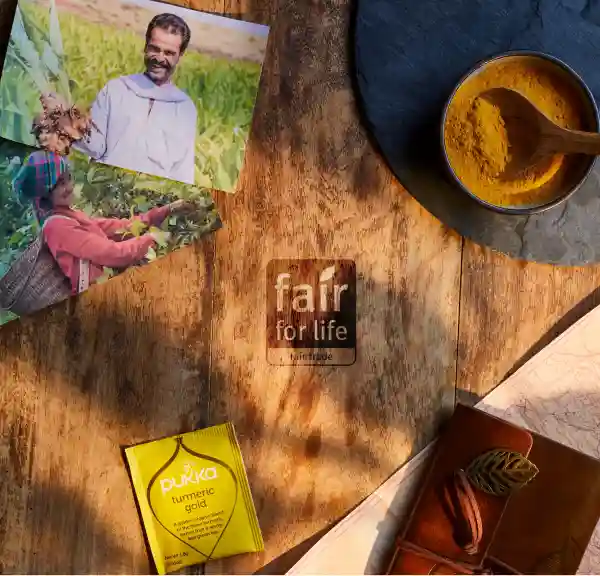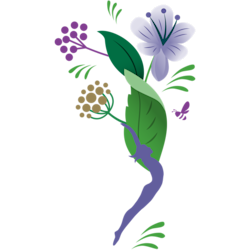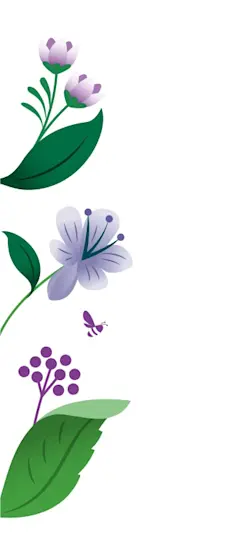

Why we are certified Fair for Life
How often do you look into your cup of tea and ask “who grew these herbs?” Probably not very often, but don’t worry – at Pukka we have that covered. Behind every cup of tea there are people growing, picking, testing, blending, packing and delivering each root and leaf.
We want everyone in our value chain to benefit from working with us, so we have worked hard over the years to pioneer new ways to ensure that we’re making a genuine contribution to equality, poverty and the environment through ethical trade. That is why all our teas are certified according to the Fair for Life standard - the gold standard in fair and ethical trade.
Fair for Life is one of the fairest, most equitable and transparent fair-trade systems in the world. You’ll see the Fair for Life logo on all our packs of tea. This is a guarantee that at least 20% (and often far more) of the herbs in each tea blend are grown on Fair for Life certified farms, or on farms certified to an equivalently high fair standard. You’ll always be able to spot the certified ingredients, as well as the overall percentage they represent on our packaging.
The Fair for Life difference
There are three key reasons why Fair for Life is different from many other fair-trade schemes:
· Firstly, it’s inclusive. Fair for Life is a guarantee that everyone along the whole certified supply chain is treated fairly and equitably. It’s not just certified farmers and producers who are checked; Fair for Life ensures everyone receives minimum wages and decent working conditions along the way. This includes our growers, blending partners, packers, as well as Pukka employees.
· Secondly, it’s a global standard. Unlike most other fair-trade standards, Fair for Life covers trade with ‘developed’ as well as ‘developing’ countries. It means that, for example, our suppliers in countries like Turkey and Hungary are also protected under the Fair for Life scheme. Essentially it means we can source even more ethical and fairly traded herbs.
· Thirdly, it’s fully transparent. You can see our suppliers and our own fair score on the Fair for Life website.


Helping communities across the globe
Like all fair certification schemes, Fair for Life guarantees decent working conditions and a ‘fair trade fund’ to benefit local families and community life. The fund is made up of fair premiums, paid by Pukka when we purchase ingredients, that the community themselves decide where to invest.
As you would expect with suppliers from many different countries, the social needs and the uses of the fair premiums are very diverse. For many communities, the priority is to keep increasing production and improving the quality of the fair certified produce. For example, farmers in India, Turkey and China have all chosen to invest in producing compost, whereas in Bosnia and Hungary they have used the premiums to invest in improved herb drying facilities.
For others, the premiums are best spent on improving their working conditions. Interestingly, FairWild licorice collectors in Spain, Georgia and Kazakhstan all came up with the same idea of investing in a caravan, where they can take shelter from the searing heat of the sun. This gives an insight into the habitat of wild licorice and the hard work that goes into harvesting its roots.
In other communities, the fair premiums are an opportunity to meet more basic needs, such as building and repairing roads and bridges in Vietnam, or firewood for heating during the winter in Bosnia and Poland. Farmers in India have purchased woollen blankets for the winter months. In Bosnia and Georgia, the collectors decided to use the money to fund dental treatment. In Georgia, we were greeted on a recent supplier visit by a family of licorice collectors with huge smiles sparkling with golden crowns, evidently very happy.
Education is also a high priority for groups of growers, with farmers in India and Turkey choosing to purchase educational materials for their children and funding scholarships and sports kits for primary school students.
Pukka’s organic and ethical teas aren’t just good for you and the environment; they are also good for all the people who work hard to create them.

Author: Marin Anastasov
Head of Procurement
Marin Anastasov grew up in Bulgaria, where he was involved in sustainable herb collection and wild resources management. He studied agriculture and subsequently completed MSc in Organic farming at Aberdeen University. Marin joined Pukka Herbs as Sourcing manager and has since led the development of the value chain, balancing the demands of rapid business growth, ethical trade and environmental conservation.
Years of experience:
25 years in organic food and farming
Professional registrations:
Marin is a Master Beekeeper and holds the National Diploma in Beekeeping, which is the highest beekeeping qualification awarded in the UK. He has active involvement in British Beekeepers Association and runs training courses for furthering the craft of beekeeping.
Education:
Marin has two MSc. One in Food Science and Technology and another one in Organic Framing. They both support his work at Pukka when it comes to compliance to standards, farming, cultivation and sourcing of our herbs, as well as herb processing and tea manufacture.
